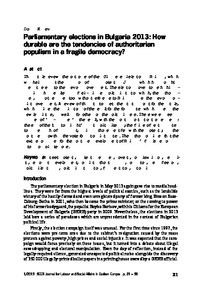Parliamentary elections in Bulgaria 2013: how durable are the tendencies of authoritarian populism in a fragile democracy?

SEER. Journal for Labour and Social Affairs in Eastern Europe
2013
16
1
21-35
democracy ; election ; parliament ; politics ; populism
Politics
http://www.nomos-zeitschriften.de/
English
Bibliogr.
"This article reviews the outcome of the 2013 general election in Bulgaria, which was held against the backdrop of mass protests in January which had brought a premature end to the previous government. The election proved to be highly unusual and has resulted in a finely-balanced political situation which, the author argues, cannot be understood without reference to Bulgaria under the previous populist government. A review of this situation sets the starting point for the article, which analyses the implications of the result for the four parties which make up the new legislature, as well as for others on the political scene. There were indeed a number of ‘mini-surprises' in the result, with the most important outcomes being: the end of the ‘traditional right' in party political terms; the failure of certain parties to make much of an impact, including those identified with the protests; and the continued growth in the vote for nationalist parties. The author concludes that the next period is key for the continued development of Bulgaria's fragile democracy into a consolidated one. "
Digital;Paper
The ETUI is co-funded by the European Union. Views and opinions expressed are however those of the author(s) only and do not necessarily reflect those of the European Union or the ETUI.